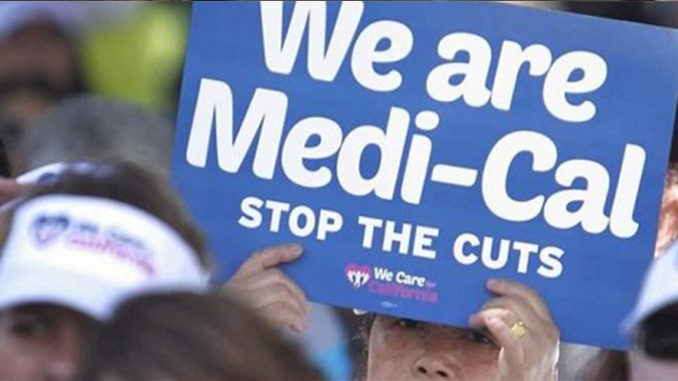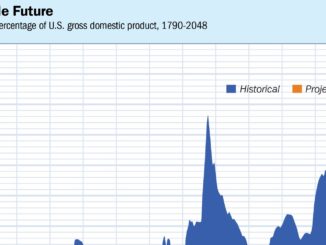
by Rebecca Beitsch
Health care workers in California protest 2013 cuts to the state’s Medicaid program that decreased payments to providers. The state is now being sued by a Latino civil rights organization that says the state’s low payment rates to doctors lead to poor care for the largely Hispanic beneficiaries that use Medicaid.
Civil rights lawyers suing the state of California over low Medicaid payments say advocates elsewhere should pay attention to a potentially novel legal tactic — accusing the Golden State of racial discrimination in order to increase funding — but some health law experts and even sympathetic observers say they’re watching with some skepticism.
A group of five individual Medicaid beneficiaries in July sued the state of California, arguing that the program’s health services for the poor are so bad that they amount to discrimination against the largely Hispanic population that relies on the program. The state has among the lowest doctor reimbursement rates in the country — only New Jersey and Rhode Island are lower, according to an Urban Institute study — and many California doctors don’t accept Medicaid patients. The result, the plaintiffs say, is long waits or far travels to receive health care.
In California, 48 percent of beneficiaries of Medi-Cal, the state’s Medicaid program, are Hispanic, compared with 20 percent who are white — the second-largest racial demographic of the program, according to the California Department of Health Care Services.
The lawsuit, filed by the Mexican American Legal Defense and Educational Fund (MALDEF) in Alameda County Superior Court, comes at a time when it has become tougher to sue Medicaid. In 2015 the U.S. Supreme Court blocked providers from suing specifically under an equal access provision of the federal Medicaid law, saying enforcement is up to the federal government.
MALDEF and other lawyers helping with the suit argue that as California’s Medicaid recipients have become increasingly Hispanic, the state’s reimbursements for Medi-Cal have fallen over time compared with reimbursements for Medicare, the federal program providing health care for those over 65.
Beneficiaries of Medi-Cal fail to receive timely access to quality care compared with the largely white populations that use Medicare or private insurance, they say.
“Medi-Cal participants suffer from greater pain, illness, and undiagnosed and untreated serious medical conditions — with significant impact to their overall health — than do their fellow Californians with other insurance,” the plaintiffs argue in the lawsuit, Perea v. Dooley.
‘A Civil Rights Issue’
Catha Worthman, a private practice attorney working alongside MALDEF attorneys in the case, said California’s low reimbursement rates make the state an outlier — a fact just as central to the case as its legal arguments. But she believes their case will become a basis for others.
“People in other states may take our case, look at it, and make a connection between health care issues in their state and their own laws,” Worthman said. “They may not have the exact same type of civil rights statutes but see a way of framing similar types of claims.”
And some outside groups are taking note, saying that if the case is successful, it could spur similar approaches in other states from groups eager to see more money invested in Medicaid.
“It’s taking payments and making it a civil rights issue,” said Matt Salo, head of the National Association of Medicaid Directors, a Washington, D.C.-based group. “Obviously any tactic that could be used in one state becomes a tactic that could potentially be used in another state.”
Lawyers at the National Health Law Program in Washington, D.C., are re-evaluating how to bring suits against Medicaid, said Jane Perkins, legal director for the nonprofit, which advocates in court on behalf of low-income people. “We read that case and considered it long and hard.”
Perkins said she believes the California case has an excellent chance of success and could inspire similar lawsuits in other states, though much would depend on each state’s laws and the facts of the case.
The California attorney general’s office did not respond to request for comment on the case. Lawyers for the state have transferred the case to federal court and earlier this week filed a motion to have the lawsuit dismissed.
Sara Rosenbaum, a health policy professor at George Washington University, said civil rights laws in some states may leave little path for suits from individuals and instead require the government to take action to address discrimination. “Not all states give the legal protections that allow people to go to court,” she said.
And discrimination might be hard to prove, said Mark Gallant, who served as counsel for the Centers for Medicare and Medicaid Services during the Reagan Administration.
He said the problems evident in the Medi-Cal program make for a good case, but that lawyers may have a tough time arguing discrimination as all participants, regardless of their race, are facing the same hurdles. He said the case also relies too heavily on comparing Medicaid to Medicare.
“Medicare has better rates than Medi-Cal. Everyone knows that, and everyone in Medi-Cal has the same problem — getting access to services because of the low rates,” Gallant said. “Latinos are not suffering more than anyone else.”
Nationally, Medicaid and the Children’s Health Insurance Program grew by 27 percent under the expansion provided by the federal Affordable Care Act of 2010, increasing the share of minorities with health insurance.
Lawyers for the five plaintiffs, most of whom are Hispanic and have serious health conditions, say they were unable to see doctors for months or had to travel long distances for routine surgery. A health care union and low-income health care clinic also have joined in the case.
Among the plaintiffs is Esther Castañeda, a 56-year-old woman from Sacramento, who lived with gallstones for over a year, struggling to keep down food as she tried month after month to schedule surgery to remove her gallbladder, according to the lawsuit. She was referred by a primary care doctor to multiple surgeons who would not take Medicaid patients and canceled her appointments.
About a year after discovering the problem, while visiting family in Mexico, she was in such intense pain she could barely walk, and her family rushed her to a Guadalajara emergency room.
Esther Castañeda
Esther Castañeda had surgery to remove her gallbladder in Mexico after she was unable to schedule the surgery in California.
“The doctor told me they needed to operate immediately, that my gallbladder was about to burst,” Castañeda said in Spanish, the Mexican doctor explaining she was at risk of dying. Her family gathered money from relatives to pay for her surgery in Mexico.
“It’s illogical to me that a country with so many resources, with so many positive things, could give the kind of service I had,” she said of the United States.
California Gov. Jerry Brown, a Democrat, agreed in June to spend an extra $325 million on bonus payments to Medi-Cal doctors — the first increase to doctor pay in 17 years — but lawyers for the plaintiffs say it will not alleviate issues enough to negate the suit.
A Case for Other States?
The MALDEF case is based largely on California’s anti-discrimination statute, which, similar to the federal Civil Rights Act’s Title VI, prohibits discrimination in a government program based on someone’s race or national origin. The suit also relies on the equal protection and due process provisions within the California Constitution. MALDEF hopes to get the case certified as a class action, which would allow the organization to sue on behalf of every beneficiary in the state.
Many states have similar civil rights laws and provisions in their constitution, but several lawyers say the strength of California’s anti-discrimination law lies in requiring lawyers to show only that a government action is having a discriminatory effect.
A similar law is on the books in Illinois, but anti-discrimination laws in other states often require proving there was a discriminatory intent behind the action. Health care and civil rights groups in Illinois said they have yet to decide if they will follow a similar strategy.
“We don’t have any plans right now to file that case, but we’ll watch it carefully,” said John Bouman, president of Sargent Shriver National Center on Poverty Law in Chicago. “I think it’s a very interesting possibility.”
MALDEF has used similar legal theory in other cases in California, including one challenging the number of minority students who were suspended or sent to alternative high schools for disciplinary issues. A similar suit against Los Angeles County’s transportation authority in 1996 resulted in a renewed commitment to bus service in poorer neighborhoods.
Even the group acknowledges the challenges of using the legal theory. Thomas A. Saenz, president and general counsel of MALDEF, said he would love to file similar suits in Texas and Arizona but the laws there aren’t as amenable to the case.
“It’s true that California has a great law,” he said, “but the state has really distinguished itself through its rock-bottom reimbursement rates.”
Rebecca Beitsch writes about fiscal policy for Pew Cheritables Trust’s Stateline.




